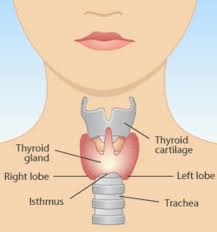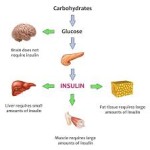 The thyroid gland sits in front of your neck, just above the notch at the base of your neck. It’s shaped like a butterfly, with the wings on either side of the trachea. It is one of the largest endocrine glands, or gland that secretes hormones into the body. The thyroid will control how the body uses energy, makes proteins and controls how your body responds to other hormones that are secreted.
The thyroid gland sits in front of your neck, just above the notch at the base of your neck. It’s shaped like a butterfly, with the wings on either side of the trachea. It is one of the largest endocrine glands, or gland that secretes hormones into the body. The thyroid will control how the body uses energy, makes proteins and controls how your body responds to other hormones that are secreted.
According to the American Thyroid Association, more than 20 million Americans have some form of thyroid dysfunction and up to 60 percent of those don’t even know they have a problem. These numbers have a significant impact on people who experience blood sugar spikes and the resulting release of insulin. That means all of us!
In a study published by the American Diabetes Association, researchers found that thyroid hormones regulate the effect of insulin on fat tissue. Insulin responsiveness was inhibited by 60% in people who suffered from hypothyroidism, or a reduction in thyroid hormone production. (2)
Another study looked at the reverse situation and found that thyroid hormones will improve the insulin signaling in the body and improve the sensitivity at the cellular level. (3) The implications from this study is that with lower levels of thyroid hormone individuals are at greater risk of developing type 2 diabetes because the body will more easily develop insulin resistance.
With insulin resistance the cells are not able to use insulin to transport glucose across the cell wall for energy. This results in a greater amount of glucose stored in the liver and as triglcyerides as well as more insulin in the blood. The insulin in the blood stream keeps the body from using fat as energy, which results in the body removing sugar from the muscles to burn for fuel.
Information has also surfaced which demonstrates that approximately 27% of diabetic patients will be diagnosed with thyroid disorders after the diagnosis of diabetes. Patients with type 2 diabetes and prior diagnosis of thyroid disorders required insulin earlier than those who were diagnosed after their diagnosis of diabetes. (4)
References:
(1) American Thyroid Association: General Information
http://www.thyroid.org/media-main/about-hypothyroidism/
(2) American Diabetes Association: Influence of Thyroid Hormone Level on Insulin Action in human adipose tissue
http://diabetes.diabetesjournals.org/content/33/4/369
(3) British Journal of Pharmacology: Thyroid hormone potentiates insulin signaling and attenuates hyperglycemia and insulin resistance in a mouse model of type 2 diabetes
http://www.ncbi.nlm.nih.gov/pmc/articles/PMC3041250/
(4) Journal of Negative Results in Biomedicine: Thyroid disease in insulin-treated patients with type 2 diabetes
http://www.thyroidresearchjournal.com/content/7/1/2
Resources:
Diabetes Spectrum: Diabetes Control in Thyroid Disease
http://spectrum.diabetesjournals.org/content/19/3/148.full
Natural News: Thyroid
http://www.naturalnews.com/025242_thyroid_cortisol_body.html
Clinical Diabetes: Thyroid Disease and Diabetes
http://journal.diabetes.org/clinicaldiabetes/v18n12000/pg38.htm
Thyoid: Introducing the thyroid gland as another victim of the insulin resistance syndrome
http://www.ncbi.nlm.nih.gov/pubmed/18346005


Leave a Reply